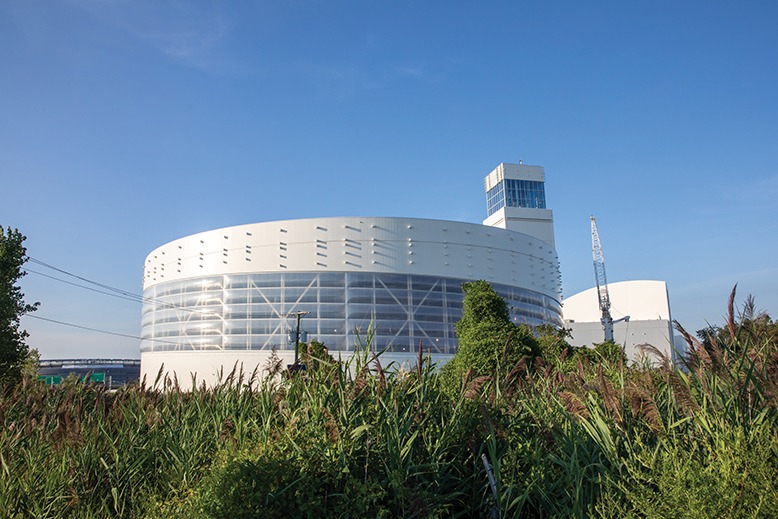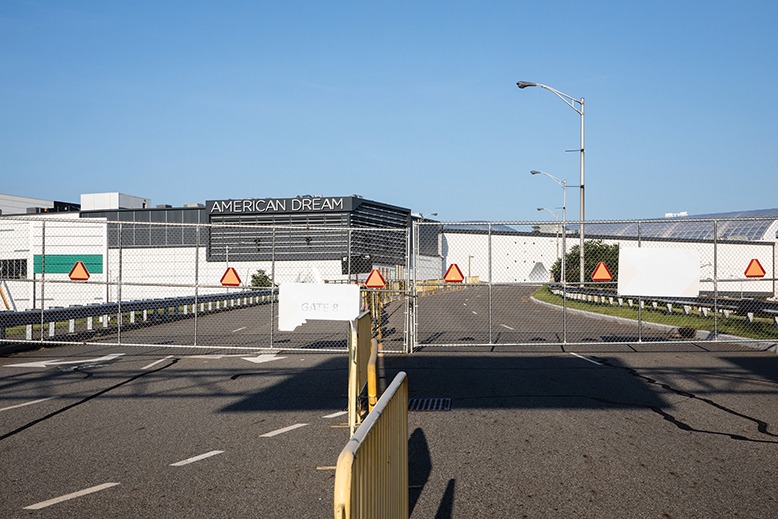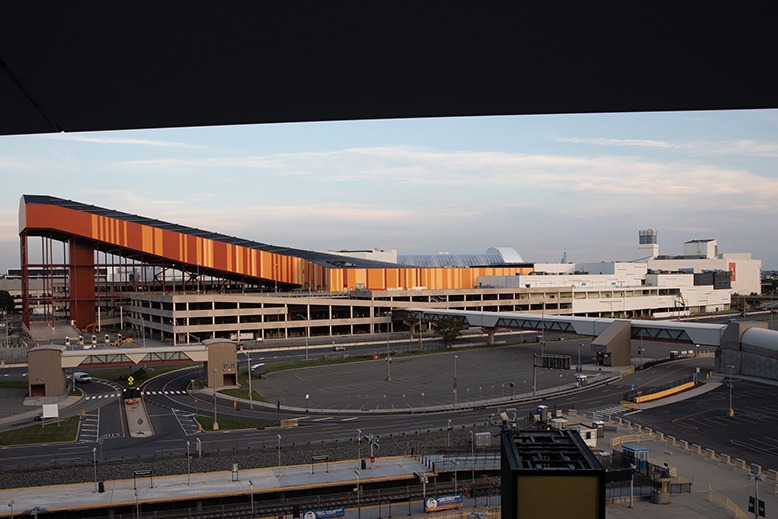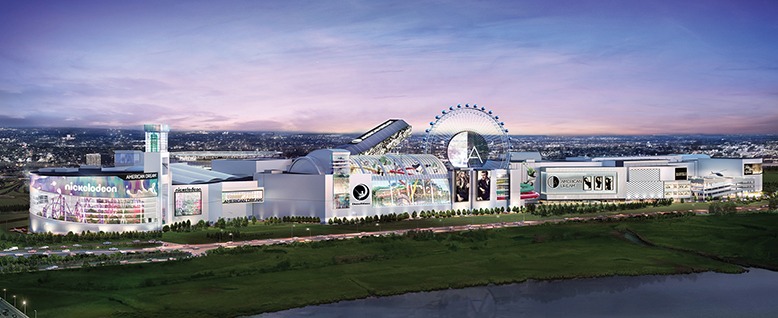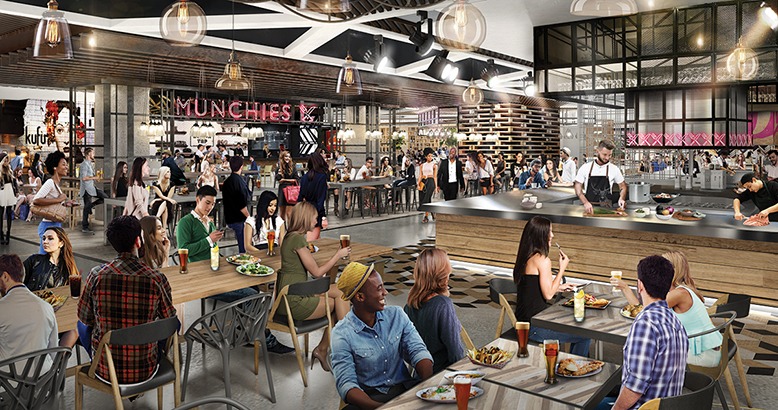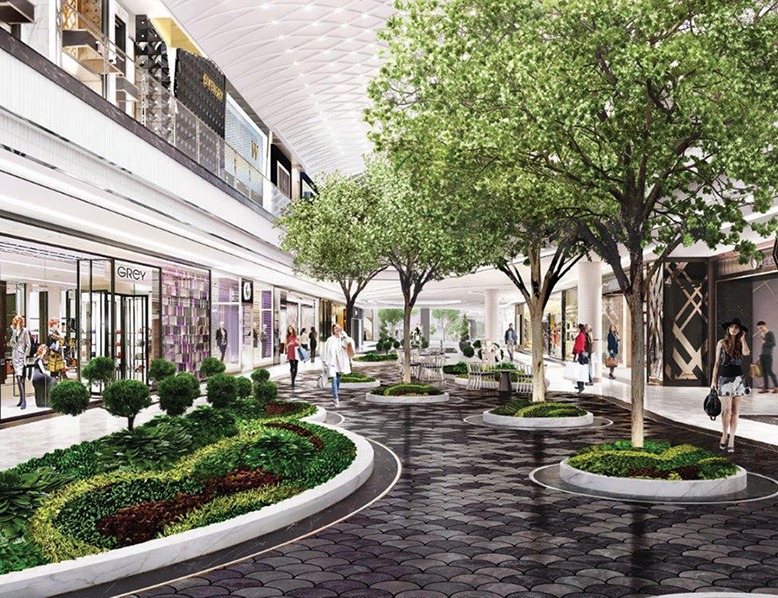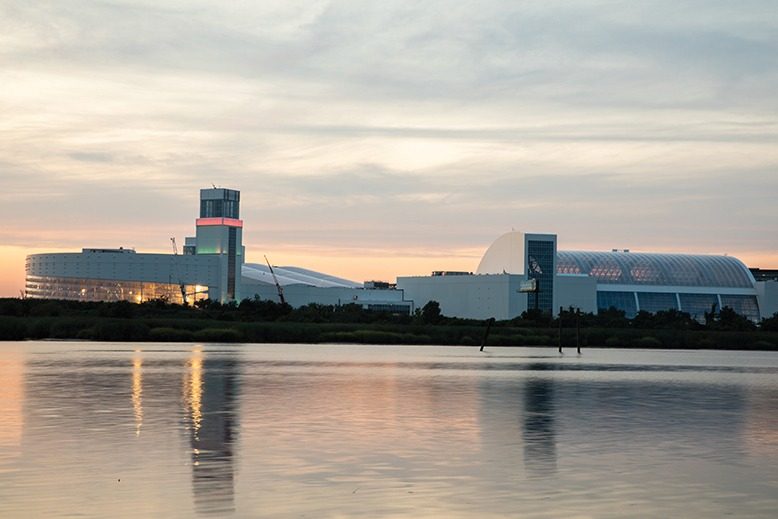
I have seen a vision of retailing’s future, and it is big. Eighteen acres big. Three million square feet of buying-and-selling space big. Seen from the 14th-floor offices of Triple Five, its developer, American Dream glitters and sprawls like some hermetically sealed 21st-century city.
In 2011, Triple Five took over the troubled project originally known as Xanadu. By August of this year—thanks to a total revamp by the Canadian-based multinational conglomerate—the only reminder of what Chris Christie famously dubbed “the ugliest damn building in New Jersey” was the multicolored exterior of the indoor ski slope. By American Dream’s announced opening date of October 25, those notorious candy-colored stripes should be gone as well, buried under coats of high-gloss white.
Of course, other projected opening dates—including fall 2013 and March 2019—have come and gone, undermined by funding hurdles and a lawsuit from the football Giants and Jets (since settled). This time, there’s an actual date attached to what Triple Five calls a rolling opening, meaning that only some of American Dream’s tenants will be open for business in late October, with others coming on through spring 2020.

Triple Five, which owns and operates Minnesota’s Mall of America and Canada’s West Edmonton Mall—the models for American Dream—is a privately held company and doesn’t make its finances public. But all indications suggest that both megamalls are doing just fine. Still, you’d be forgiven for wondering whether American Dream will follow suit, given its bumpy trajectory (three owners, one bankruptcy, missed deadlines, construction standstills). How Triple Five handles traffic and the rolling opening (will there be enough fun available in the early months to satisfy fun seekers?) could help decide whether American Dream fulfills its promise—not just as a retail and entertainment magnet, but as the potential employer, along with its tenants, of some 17,000 Garden State residents.
The state is certainly betting that it will, in the form of a $390 million Economic Redevelopment and Growth grant—essentially a tax break, and the largest one in New Jersey’s history. Triple Five is in on that bet, having invested $3 billion in the $5 billion project, including a $1.7 billion construction loan collateralized by the Mall of America, an $800 million tax-exempt bond offering backed by payments in lieu of property taxes to the Borough of East Rutherford, and a $300 million bond offering secured by the state’s aforementioned grant.
Lest you think there’s not much happening under that shiny shell along Route 3, an August walk-through of the site, which consumed nearly 90 minutes, revealed a flurry of construction activity and at least some areas near completion. The property is shaped roughly like a reverse letter P, with most of the major entertainment attractions in the curve and the luxury-retail wing at the bottom of the stem. Other retailers and entertainment venues are interspersed throughout.
The first stop on the tour was the NHL-regulation size recreational skating rink, which, like most of the large entertainment areas, is topped by a glass dome. Though the ice wasn’t yet in place, the tiered seating areas, which can accommodate 4,000 spectators, were.
Nearby, the DreamWorks-themed water park was even further along and actually included a little water in the hot tubs attached to the private three-story cabanas. Madagascar Island, with its exotic faux foliage and multiple multicolored water slides, was rising from a sea of concrete, while across the park, a pair of elevated pagodas stood sentinel over a construction crew working on the Kung Fu Panda Temple of Awesomeness.
Like so much of American Dream, the water park floats in a sea of superlatives. According to Triple Five, it will be the second largest water park in the world and will feature the world’s largest hydromagnetic water coaster. At 1.5 acres, the wave pool, capable of generating 2- to 6-foot waves, will also be the world’s largest. Triple Five is clearly banking on those superlatives to help draw a projected 40 million visitors annually. The 8.5-acre Nickelodeon Universe theme park, for instance, where in August a variety of roller-coaster tracks snaked above a partially constructed Slime Stage and a panoply of colorful kids’ attractions, like Blaze’s Monster Truck Rally and Blue’s Skidoo, will be the largest indoor theme park in the Western Hemisphere, housing the world’s steepest roller coaster and largest spinning coaster.
Though the Munchies food hall (a partnership with the popular food website) was still mostly a shell, it too will be big: 38,000 square feet, with 18 yet-to-be-named vendors. If you have the wherewithal, you won’t go hungry at American Dream, which promises Coca-Cola-branded and kosher food courts, an H-Mart Asian market, some 20 full-service restaurants, local and global cuisines.
In addition to sheer size, American Dream’s big draw is entertainment (including dining), which is expected to comprise 55 percent of the “destination,” as Triple Five likes to characterize the complex. “We don’t call it a mall,” stresses American Dream’s PR director, Dana McHugh. That’s likely because the mall as we know it—an enclosed space filled with shops, a food court and a handful of department-store anchors—is on its way out as a retail institution, rendered irrelevant by the Internet and a generation that appears to be more interested in doing than having. Two of American Dream’s anchors—traditionally, large department stores that could be counted on to attract shoppers—are, in fact, entertainment venues (Nickelodeon Universe and DreamWorks Water Park); the other two are Saks Fifth Avenue and Barney’s, both housed in the luxury wing. (As of this writing, Barney’s, which filed for Chapter 11 bankruptcy in August in order to restructure its debt, was still moving ahead with its American Dream store.)
A few major attractions were not covered on the tour, including a massive planned Ferris wheel. Also unseen: an aquarium, a Lego Discovery Center, and a KidZania (where kids can pretend to be grownups earning money at their chosen professions in order to spend it on goods and services). Publicist Kahlil Spurlock attributed the omissions to Triple Five’s attempts “to keep tours to a reasonable time frame.” The tour did take in the infamous ski slope, which has two runs, plus a bunny hill, not yet bearing its projected 2-foot blanket of snow. It’s one of the few original features remaining after Triple Five effectively gutted the interior when it took over the project
And while 45 percent of the complex will consist of retail establishments, all of them, according to McHugh, are required to have an experiential element (touch-screen mirrors, say, or chair massages). That reflects the growing conviction of retail insiders that, to compete with the Internet, brick-and-mortar shops have to offer fun beyond the gratification of, say, snagging a $1,300 Hermes credit-card holder. In August, many of the storefronts were still under construction. In the luxury wing, Dolce & Gabbana was merely a small sign among a forest of girders. But the two-story Hermes façade was up and gleaming, and the wing’s glitzy, scalloped, onyx-and-marble floors were in place, likewise a grand, hand-blown, glass-and-crystal chandelier.

YEARS IN THE MAKING: For a decade and a half, cranes and scaffolding promised something big was coming, but the fulfillment of that promise was often in doubt as the project confronted financial crises, bankruptcies, lawsuits, and other hurdles. Even after the megamall is fully open, construction equipment will be part of the scene for some time, if American Dream’s owners go ahead with two hotels planned for the site. Photo by Chris Lane
Triple Five wasn’t willing to disclose what percentage of shops and attractions are slated to open in October, but they did confirm that Nickelodeon Universe, DreamWorks Water Park, the skating rink, the ski and snowboard park, and an Angry Birds 18-hole mini golf course will be up and running, along with “unparalleled experiential destination shopping.”
No one knows how many visitors will show up during American Dream’s early weeks (the parking lots have space for 30,000 cars), but back in August, many local officials were feeling jittery about the prospect of all those shoppers and thrill-seekers descending on the Meadowlands. New Jersey Transit’s promised transportation solution had yet to be announced. But a spokesman for Triple Five said at the time that the company was “working closely with New Jersey Transit and New York Waterway to provide guests with convenient, easy ways to reach American Dream from New York and the surrounding area.”
A planned on-site ride-share hub may help. And two projected hotels, connected via skybridge to the luxury wing, could dissuade metro-area visitors from making day trips in rented cars. The hope is they’ll take the bus. Though there are no projected dates for their completion and ground has yet been to be broken, one thing is certain: The hotels will be big.

